From The Chair
We probably can all agree that 2020 has turned out to be a very different year than any of us expected. In the spring, we had about two weeks to completely convert our classes to a remote learning format. Then came summer where he had to offer our classes remotely. Then there was the fall, when we had a choice of whether to offer classes on line or socially distanced in person. We gained a whole new vocabulary including words like “hybrid,” ”asynchronous,” “synchronous,” and, of course, “zoom.”
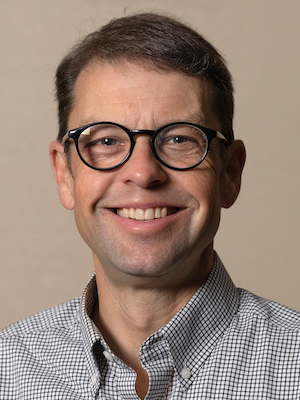
Staff and personnel changes have also been part of this year. Our administrative assistant, Kristin Kallsen-Thomas, left to pursue new opportunities in Colorado and we wish her well. Our new administrative assistant, Jan McKown, has come on board and now serves us with a helpful attention to detail that is very much needed in a year of so many changes. Keith Pickus is returning to our department as well, having recently served with the WSU Foundation, and will start offering classes in the spring of 2021. We are also exploring new courses and arrangements with other faculty and adjuncts to bring a new range of courses to our students.
This is our university’s 125th anniversary and while 2020 has changed how we celebrate, this is still a chance to reflect on where we have been and where we are going. Changes have been part of our story since the 1890s. We will continue to adapt and respond. We’ve got this!
Local and Community History Program News
Students in the Local and Community History program found this year to be particularly challenging with balancing work, family, classes, internships, and social distancing. A cohort of students had planned to present at the Kansas Association of Historians only to find the conference postponed a year. Still, the creativity of our students has been invaluable. The Society of Public Historians pivoted to holding its meetings on line with each monthly meeting including a slot for a student guest speaker to discuss their current research. SPH helped with WSU’s 125th celebration by leading a socially distanced walking tour of campus in October. Students have found ways to do their research on line and have been able to join a host of remote conferences. Work continues on completing the third Luke the Longhorn graphic novel with Andrea Wilson and Lisa Duran working with artist Miles Foley. Keith Wondra continues his passion to write the story of West Wichita and is also helping Barb Myers in her efforts to list Highland Cemetery on the National Register of Historic Places. Josh Mackey and Brooke Talbot have helped bring the online Somos de Wichita project to a reality (check out somos.wichita.edu for more information).
Moreover, employment opportunities continue to develop. Josh Mackey has joined the Kansas Aviation Museum as curator. Jessica Tung and Darlajean Gilbert have joined the Society of Decorative Painters. Several alums now work for WSU including Bethany Kennedy with the Hugo Wall School of Public Affairs, Erin LeBegue for the Honors College, Andrea Wilson at the Center for Economic Development and Business Research (CEDBR), and Kathy Gale for the Liberal Arts and Sciences Advising Center.
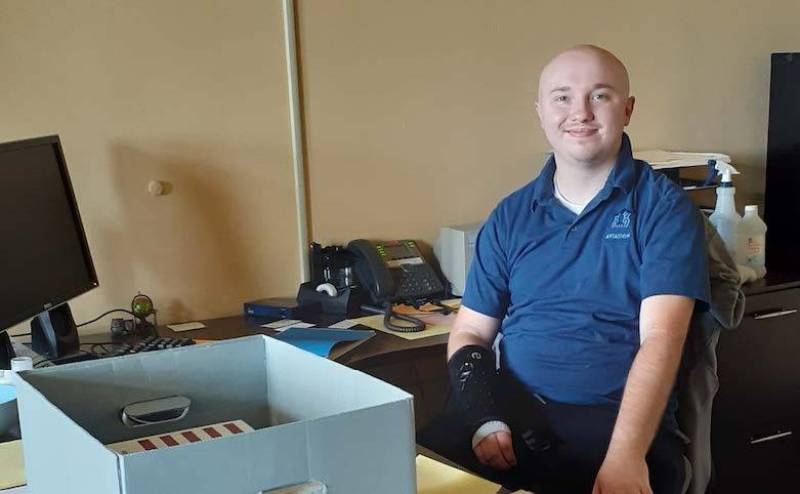
Several of our alumni are now helping instruct the next wave of students. Dee Harris now teaches our Museum Methods class. Seth Bate co-teaches HIST 701 to bring a leadership-focused framework to local history training. Andrea Wilson has taught classes for us. Leigh Jackson remains an invaluable go-to resource for how to conduct online classes and newly graduated MA Carolyn Speer is at the Media Resources Center as an essential support in creating online classes. We could not have done it this year without them! Dr. Dan Fullerton at the Command and General Staff College at Fort Leavenworth is now serving as an adjunct in a number of military history related courses.
While things change, the need for connecting historical scholarship with the larger public is more important than ever. Our students are up to the task!
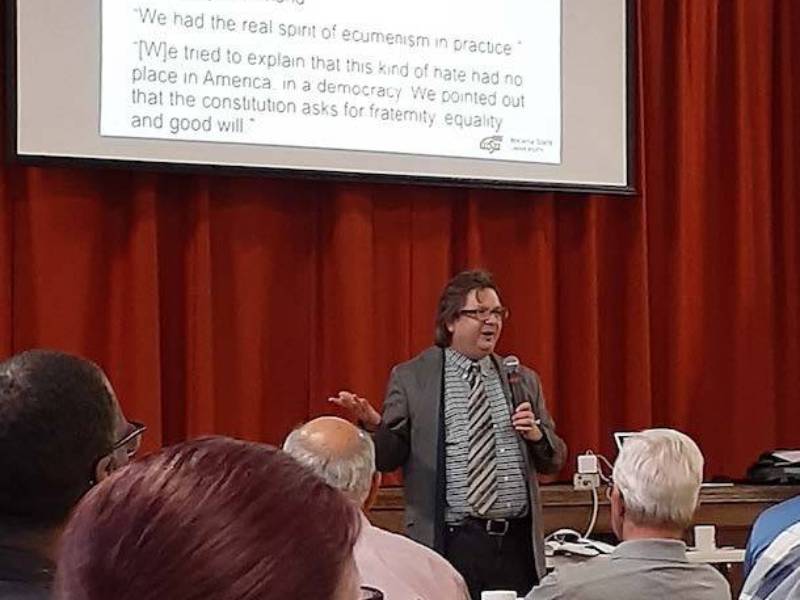
Interview: Jan McKown, Our New Office Administrator
Look out for a new face in the Fiske Hall this year. So far her time with us has been during the eerily quiet chaos of our Covid age. We look forward to more in-person office chatter soon!
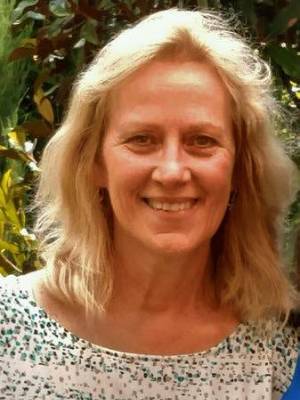
Q: How long have you worked at WSU and what departments have you worked with?
A: Part-time since 1998, and full-time since 2000, I’ve worked primarily with the Social & Behavioral Sciences programs, including Psychology, Social Science Research Lab, and the Applied Psychology Research Institute.
Q: What drew you to the history department?
A: I feel the humanities are necessary in our world, more now than ever before. I wanted to continue to be involved with an area that made a difference. And, in my short time of employment, I can already see the Professors’ strong support and commitment to their students and our local community.
Q: Is there a particular topic in history that you find interesting?
A: I would like to learn more about European History. I have only briefly travelled abroad, but that is something I plan to do upon retirement, so I would love to explore and learn more before travelling to my choice destinations.
Faculty News
The 2019-2020 academic year was certainly an eventful first year for Laila Ballout at WSU. She’s grateful for the time she was able to spend meeting colleagues and students in-person before pandemic disruptions. Especially enjoyable was a panel event in Fall 2019 with faculty from across the university and community members discussing films about Christian minority communities in the Middle East. She looks forward to future days when she can more easily meet people from across the WSU community again.
This past year, she has developed and taught new courses exploring the history of the 20th century U.S., U.S. Foreign Relations, and Immigration history. The pandemic upended her conference presentation and research travel agenda for 2020, but she kept busy furiously re-examining old archival finds. Luckily, some organizations have been just as furiously adding to their digitized collections. Especially fun to examine have been episodes of the MacNeil/Lehrer show, Firing Line, and Fresh Air from the 1970s and 1980s. She’s finally submitted for publication an article she’s been developing for many years examining an American evangelical radio station in south Lebanon in the 1980s, and continues making steady progress on her book project.
Fall 2019 marked George Dehner’s return to the classroom after his spring sabbatical and he enjoyed interacting with students again. Unfortunately, George’s research work on epidemics in history soon became all too relevant. In April he gave a talk for the Fairmount College’s Perspectives on the Pandemic series, has done some media and podcast interviews, and has been invited to be part of a pandemic roundtable at the (now sadly virtual) American Historical Association’s annual conference in January. He also continues his work on the Legionnaire’s disease manuscript. Fortunately, all in George’s immediate orbit have remained unscathed by Covid thus far. His youngest Sean is a sophomore at Kapaun, Patrick a freshman at K-State and Brendan a junior and proud Shocker. Jodi remains busily employed working at the dining room table. The one with the most positive view of events is Trooper who now has a number of people about to take him on walks. George looks forward to escaping his basement and returning with students to the classroom — hopefully in the near future.
Modern Europeanist John Dreifort continues to teach his full array of freshman, upper division, and graduate-level classes. He continues to teach over-subscribed adult education classes to senior citizens who are dedicated to life-long learning. As a recognition of his teaching, he was the recipient of the WSU “Leadership in the Advancement in Teaching Award” for the academic year 2019-2020. He stayed on as Executive Secretary of the Wichita Committee on Foreign Relations, which brings a wide array of prominent speakers to Wichita as well as to campus to speak on issues of foreign policy and national security. On campus he continues to serve on various committees, including an ongoing university strategic planning task force. He continues to make slow progress on his book project related to the relationship between Generals Eisenhower and De Gaulle during World War II, as well as several articles. He hopes that his former students stay well and that they keep reading history.
2019-2020 marked an important milestone in Jeff Hayton’s WSU career: tenure. After a year spent organizing published materials and reference letters, not to mention signing countless cover sheets, he was promoted to Associate Professor. Thanks to the good guidance from the history department and staff in the college, this was a relatively painless process. Furthermore, it is nice to know that others in the university feel your work has merited such recognition.
While Covid-19 might be keeping Jeff online instead of in the classroom, it hasn’t stopped his vigorous research agenda. The book chapter “Shouting Back: Protest and Political Movements” is coming out later this year in a volume edited by Klaus Nathaus and Martin Rempe called Musicking in Twentieth-Century Europe (De Gruyter). He is just starting work on another book chapter about Krautrock and German punk and NDW for a Cambridge companion volume edited by Uwe Schütte which will be out next year. Finally, while the pandemic has delayed production slightly, his book Culture from the Slums: Punk Rock in East and West Germany will be coming out in summer 2021 with Oxford University Press. With the book project done, Jeff is working on a new journal article about fanzines and DIY publishing, as well as another on the spaces and mobilities of dissent in the German Democratic Republic.
In the past year, Jeff helped lead a seminar at this year’s German Studies Association’s annual conference on ‘Socialist Subjectivities: Rethinking East Germany under Honecker’ that explored daily life in the GDR during the 1970s and 1980s. Along with two colleagues, he spent the year organizing the workshop and they will now work on publishing the papers as an edited volume. Jeff is also working with two different colleagues on a big conference on German popular music in the twentieth-century that will hopefully be held in a year once travel and large gatherings are deemed safe again. We hope to get David Hasselhoff to sing at it… stay tuned…
Teaching during a pandemic has definitely been a challenge, but Jeff is adapting as best he can. In addition to his normal set of classes, he launched a new First-Year Seminar this year called ‘History and Rock ‘n’ Roll’ that seeks to introduce first-year students to the study of history by way of popular music. So far, it has been very enjoyable to teach, and the students also seem to like it (or maybe they just like listening to good music during class rather than me droning on). He also hopes to de-stigmatize listening to Meatloaf and thinks this course will be a good vehicle for doing so. In addition to this new course, Jeff has agreed to become the department’s new Undergraduate Advisor and hopes to recruit more majors to the program in the coming years.
During the 2019-2020 academic year, , Dr. Robin Henry remained busy in her research, teaching, and academic and public presentations. She published a chapter on the history of labor violence and teaching, and two articles and several blog posts on accessibility and the Americans with Disabilities Act. Additionally, she became the creator, writer, and host of a 6-part podcast series on the centennial of the 19th Amendment, “Hindsight: Looking Back at 100 Years of Women’s Suffrage. Finally, she presented or planned to present before COVID-19 interrupted at several academic conferences, including the Western History Association, the Social Science History Association, the Berkshire Conference on Women’s History, the American Society of Legal History, and the American Historical Association annual meetings.
In addition to her research, Dr. Henry continued her work with the Law and Public Policy consortium in the Bill and Dorothy Cohen Honors College and became a Tilford Fellow to develop a course on LGBTQ+ history in the United States for the history department. She finished out her tenure on the Editorial Board of H-SHGAPE, the online listserve for the Society of Historians of the Gilded Age and Progressive Era. Throughout the year, she made several presentations and led roundtable discussions on women’s history, the 19th Amendment, and the Equal Rights Amendment on campus and around the community. She continues to write and deliver historical wcommentary for the series “Past and Present” on KMUW; and organize the Department of History’s speaker series.
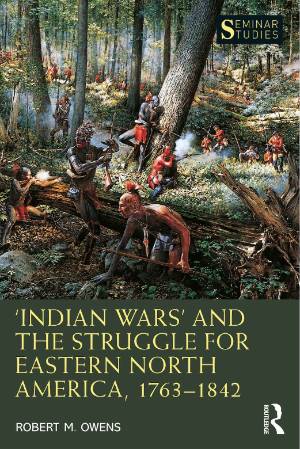
Dr. Robert M. Owens taught a number of courses in the past year, including Colonial America, and both halves of the U.S. Survey. He spent most of the summer writing for his project on the topic of Indian-white murders on the early American Frontier. He also completed ‘Indian Wars’ and the Struggle for Eastern North America, 1763-1842, a reader with documents, for Routledge Press, to be published in November 2020.
Keith Pickus is returning to a full-time faculty role in January, 2021, after a 19 year hiatus as a university administrator. His teaching duties will be divided between the History department and the Cohen Honors College. Professor Pickus will teach courses on European and Contemporary history that focus on information literacy and preparing students to become engaged and informed citizens.
2020 has been a challenging year for Jay Price, now serving in his fourth term as department chair. The turmoil of the pandemic was the main challenge for the spring. In the summer, he guided our new administrative assistant, Jan McKown, with learning the department and its needs. Preferring to deal with the rigmarole of zoom to the rigmarole of masks and social distancing, he has been teaching remotely. He had already planned on offering his History of Kansas class as a fully online format and the summer’s early weeks were filled with creating the materials for that class that debuted in July.
The pandemic also shifted several projects. Working with Dr. Enrique Navarro of Modern and Classical languages, Jessica Cerri from Special Collections, and a team of students, he planned on launching a portable exhibit Somos de Wichita/We are Wichitans to tell the story of Latinos in Wichita. The pandemic made that impossible and the team quickly retooled to turn the exhibit into a bilingual web-based exhibit with the pop up portion of the project take place in the future. Check out somos.wichita.edu to visit the exhibit.
In addition to finishing up on the third Luke the Longhorn graphic novel, Price was part of a team to create an additional graphic novel to mark the university’s 125th anniversary. Called “A walk with Wu: The Story of Wichita State University,” this book tells the story of our college from Fairmount to the present with artist Genna Pennington bringing WuShock to life as our tour guide.

Another project involves his work with Dr. Robert Weems and Dr. Sue Abdinnour from the Barton School that is using a survey of business owners in the community to compare and contrast the worlds of Black, Hispanic, and Asian ethnic entrepreneurs. He also is working with Abdinnour and the team that produced the Pizza Hut museum to write an article about the experience. The accessibility lessons that the Pizza Hut Museum revealed has let to several opportunities to talk about the issues of accessibility in museums, including a panel at the Western History Association.
Currently, Price continues to develop research on the Latino/Hispanic community of Wichita among a number of local and community projects. His work with colleagues means that collaborative projects remain active with new directions showing up in surprising ways. He has returned to being on the Kansas Historic Sites Board of Review with those meetings now taking place on line. He loves supporting students and alumni in their efforts, many of which now take place virtually. He has taken advantage of a number of on-line conferences that have inspired him to develop new classes for the future. Time at home has also provided additional opportunities such as continuing to take online classes to learn Spanish. Not being able to travel in the real world, he has reconnected with his love of model trains to take a few “rail journeys” in HO scale!
Rannfrid I. Thelle directs the Religion Program, housed in the History Department. She teaches Religion classes, including Old and New Testament Introductory courses and a third, topical course, every semester. In the Fall of 2020 students were offered a new course called Jesus: Traditions and Images, which explores a range of ways the figure of Jesus has been expressed in art and culture, as well as in theology and religious practice. In in Spring 2020 students can take a class called Violence and the Bible. Auditors are always welcome!
Rannfrid’s research in the past year has focused on a book project called Babel and Bible. In this project, she explores the many ways in which the “discovery” of Mesopotamian cultures in the nineteenth century impacted the field of biblical studies. Dr. Thelle served as officer in the Society of Biblical Literature Southwest Region. She delivered the presidential address at the organization’s annual meeting in Dallas last February, with a lecture about the contributions of the Old Testament scholar, Sigmund Mowinckel. Her talk, a part of her book project, centered on this Norwegian scholar’s use of Babylonian ritual to understand ancient Israelite cultic practice. Mowinckel’s comparative approach was radical in the early twentieth century, because he incorporated anthropological insights about the importance of religious practice in understanding ancient religions, when most of his contemporaries emphasized philosophy and doctrine over ritual.
After sixteen years of serving as undergraduate advisor for the department, Craig Torbenson passes the torch on to the next generation. He continues teaching a world and human geography course each semester along with a regional geography course. He and his wife are co-directors of the Derby Kansas Family History Center, although the center is closed for most of the year due to the virus. He ran in the school’s Pumpkin Run on campus last fall averaging ten minutes a mile and finishing in the top three for his age group.
Professor Weems,, like everyone else, has witnessed a change in his professional and personal life because of COVID-19. Before March, 2020, Dr. Weems considered himself an “old-school” historian who had no interest in teaching online. However, when WSU quickly pivoted from in-person to online instruction during spring semester 2020, Weems had to quickly develop a new skill-set. To his surprise, Professor Weems has grown to enjoy online teaching using Zoom. Among other things, he especially likes having the capability to record class sessions and subsequently share them with students. The appearance of COVID-19 also had an impact on the promotion of Weems’ scholarship. Apparently in the realm of bad timing, the University of Illinois Press released his new book The Merchant Prince of Black Chicago: Anthony Overton and the Building of a Financial Empire in early March, 2020. Moreover, there were plans to actively promote The Merchant Prince of Black Chicago at the Annual Meeting of the Organization of American Historians scheduled for early April in Washington, DC. However, the subsequent cancellation of this meeting, because of COVID-19, meant the loss of an important marketing/promotional opportunity. While slightly disappointed about this turn of events, Professor Weems, nevertheless, is glad to have completed this ten-year project. Moreover, other marketing events, such as a July 28 Zoom book talk sponsored by Watermark Books of Wichita, have helped in getting the word out about his latest book.
Notwithstanding COVID-19, Professor Weems has continued to be associated with activities that have enhanced his professional visibility (as well as that of the Department). On July 20, 2020, he appeared on Marketplace, the National Public Radio business show (where he discussed how the decline of black-owned insurance companies has widened the racial wealth gap). He also published a short essay on the Humanities Kansas website (“It’s Time To Tell The Stories of African American Entrepreneurs”) as part of its’ “Big Ideas” initiative. On September 17, 2020, Weems participated in a follow-up Zoom session related to African American entrepreneurs. In addition, Dr. Weems, Dr. Jay Price of the History Department and Dr. Sue Abdinnour of WSU’s Management Department are continuing to make progress on their study of nonwhite/ethnic entrepreneurship in Wichita. Finally, on September 2, 2020, Professor Weems was featured in The Wall Street Journal. He appeared in a quarter-page ad, purchased by Marquis Who’s Who (the publishers of Who’s Who in America), honoring Weems and other recipients of their “Alfred Nelson Marquis Lifetime Achievement Award.”
Speaker Series
The Department of History’s Speaker Series entered its seventh year in 2019. In the spring, the department welcomed Dr. Erik Huneke, Assistant Professor of History, University of Central Oklahoma to give a talk, “What Difference Did a Wall Make?: LGBTQ+ Activism on Both Sides of the German Cold War Divide.” For many of us, this was our last campus event before WSU shutdown in response to COVID-19. For Fall 2020, we are going virtual! Our fall lecturer is Dr. Mona L. Siegel, Professor of History at California State University, Sacramento who will speak on the global history of the 19th Amendment on Thursday, October 22nd at 7PM. Since this will be a Zoom-powered lecture, anyone can join in, so please contact Dr. Robin Henry at robin.henry@wichita.edu for the Zoom link.
Student Awards 2019-2020
Covid may have disrupted the classroom experience and cancelled our annual spring luncheon, but it has not derailed the stellar work of our undergraduate and graduate students. Thanks again to our generous benefactors, the department is able to recognize their fine achievements with awards. In the undergraduate paper category, Damon Penner received the Douglas Bendell award in Research and Writing and Noah Blanco’s paper was selected for the John Rydjord Jr citation. Brooke Talbott’s paper was chosen for the Phi Alpha Theta Kind Shepherd prize and Joshua Mackey (Non-Seminar) and Rhenee Clark Swink’s (Seminar) papers were identified as the best graduate submissions for the Fiske Hall Awards.
Covid may have disrupted the classroom experience and cancelled our annual spring luncheon, but it has not derailed the stellar work of our undergraduate and graduate students. Thanks again to our generous benefactors, the department is able to recognize their fine achievements with awards. In the undergraduate paper category, Damon Penner received the Douglas Bendell award in Research and Writing and Noah Blanco’s paper was selected for the John Rydjord Jr citation. Brooke Talbott’s paper was chosen for the Phi Alpha Theta Kind Shepherd prize and Joshua Mackey (Non-Seminar) and Rhenee Clark Swink’s (Seminar) papers were identified as the best graduate submissions for the Fiske Hall Awards.
In the graduate category, Logan Daugherty’s outstanding graduate performance was marked with the John Rydjord Fellowship and Joshua Mackey’s work was rewarded with the Anthony and Dana Gythiel Endowed Scholarship/Fellowship. With the support of our donors, the department was able to make awards to bolster graduate research. Kaitlyn Eddins received the Miner/Unrau award for the fall of 2019. The William and Ruth Heaston PAT Gamma Rho Award was presented to Joshua Mackey for the fall of 2019 and Barb Meyers for the spring of 2020.
Congratulations to all our outstanding winners and our deepest thanks to all the department’s benefactors. Have a safe and healthy 2020-21!
Alumni News
Donald E. Fisk, B.A., History, 1972
Don spent three weeks in Europe with fellow class of ’72 grads, visiting Belgium, Switzerland, Luxembourg and France. Gravenstein Castle [Ghent, Belgium], Castle Chillon, [Switzerland], Vianden castle [Luxembourg] and many other medieval and ancient Roman sites were explored. He has begun expanding a series of his four Bozeman Trail articles into a book. Don is beginning his fourth year as President of the Fort Phil Kearny/Bozeman Trail Association and the Vice President of the Custer Battlefield Historical and Museum Association, for which he created and led a tour of Fort C.F. Smith and the Hayfield battle sites in Montana last June. Don is a member of the Northern Cheyenne Fort Robinson Breakout Committee, assisting in planning and raising money to complete a permanent, signed path from the Fort Robinson, NE, barracks to the Cheyenne Bluffs, a few miles from the fort.
Jason Herbert, B.A. 2012, M.A. 2015
Now an ethnographer for the Seminole Tribe of Florida, where he is assisting in the Tribe’s contributions to the Comprehensive Everglades Restoration Project, the largest environmental reclamation project in history. He is currently a doctoral candidate at the University of Minnesota, where he will defend his dissertation, “Beast of Many Names: Cattle, Conflict, and the Transformation of Indigenous Florida, 1519-1858,” in 2021. He is also the creator of Historians At The Movies, a weekly multimedia event that connects history and film lovers around the world through the power of social media. You can learn more about #HATM by finding him on twitter @herberthistory or at historiansatthemovies.com.
Nathan Heiman, B.A. 2005, M.A. 2007
After finishing at Wichita State, he pursued additional graduate studies at the University of Denver, earning a Master’s in International Security from the Korbel School of International Studies in 2010. Moving to Washington, D.C., he joined the staff of Senator Jerry Moran and serves as the Senior Foreign Policy Advisor. In addition to advising on pressing national security issues, Nathan assists Senator Moran in his responsibilities as a member of the State/Foreign Operations Subcommittee on Appropriations, which funds our nation’s diplomatic and foreign aid programs.
Theodore (Ted) Jamison, M.A. 1966, Ph.D. TCU 1972
Taught at San Antonio College, Southwest Texas State University, University of Nebraska Graduate Faculty (History), Westmar College and Del Mar College. Strategic Air Command Historian until 1993. Doctorial dissertation published in 1975 followed by several scholarly articles, and four monographs. Retired in Corpus Christi since 2015.
For more information contact:
Paul D. Travis, B.A., M.A., Wichita State, Ph. D., University of Oklahoma
Paul has retired from Texas Woman’s University, in Denton, with the rank of Emeritus Professor of History. His career includes a total of fifty-eight years of teaching.


 Photo: Jay Price
Photo: Jay Price